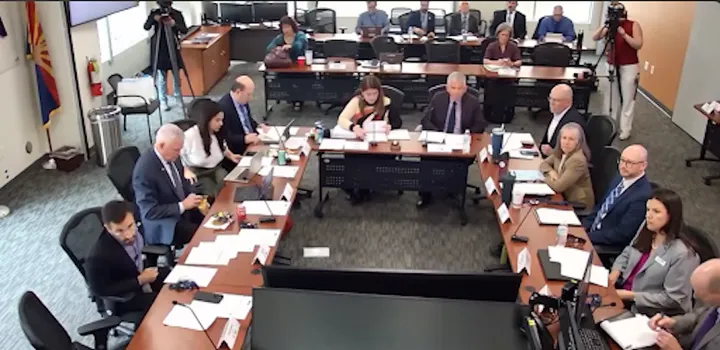Arizona court criticized for AI death penalty announcement
The Arizona Supreme Court is facing criticism for using an AI-generated reporter to announce a man’s death sentence, a move critics say dehumanizes a life-and-death decision.

The Arizona Supreme Court is facing backlash after using an AI-generated reporter to deliver the news that a man’s death sentence had been upheld.
The court rolled out its new artificial intelligence reporters, Victoria and Daniel, on YouTube earlier this year, with officials saying the goal was to “make the process of getting news out more systematic.”
This is an opportunity “to meet the public where they’re consuming their media,” Communications Director Alberto Rodriguez said in a May interview with NBC News.
But some organizations have taken issue with the practice after AI reporter Daniel delivered the news on Aug. 5 that Jasper Phillip Rushing’s death sentence had been upheld.
Rushing was convicted of another person housed at the Lewis Prison Complex in Buckeye in 2010.
Death Penalty Alternatives for Arizona shared the video to Instagram, saying, “We're officially living in a Black Mirror episode.”
“Imagine your last hope of a new trial or a reduced sentence—your one shot at life—being denied by an algorithm in a suit. No emotion. No humanity. Just a polished, fake face delivering state violence like it’s a weather update,” the post said. “This is erasure. Of grief. Of nuance. Of the very real people caught in the devastation of our legal system. Both of those who’ve been harmed and those sentenced to die.”
The court's communications team did not respond to multiple requests for comment by Tucson Spotlight.
Tucson groups are also taking issue with the practice. Caroline Isaacs, executive director of the abolitionist group Just Communities Arizona, says it aligns with the carelessness she sees shown toward those affected by the death penalty.
Just Communities Arizona focuses on creating, fostering, and building community for those affected by the criminal punishment system.
“It's really kind of perfectly in line with generally how sanctioned murder has always been filtered for us,” Isaacs told Tucson Spotlight. “Through paperwork, through legal entanglements, through steps of removal of the identity of people involved in that process.”
Isaacs said she recognizes that there may be a shortage of reporters, and it may be expensive to retain them, citing nationwide layoffs. But she said this is happening at a time when people are already heavily distrustful of the media.
“Bob the Chatbot is not going to make me feel better about the news that you are delivering,” Isaacs said.
Isaacs said she’s frustrated with the justice system as a whole and that while the news about the AI reporters is disappointing, she wasn’t surprised. It’s common, she said, for people not to find out that their incarcerated family members have died until they learn about it in the news.
“The humans in charge of these systems often don't give that basic dignity to people,” Isaacs said.
Rodriguez told NBC that the script read by the AI reporters is human-created, and no generative AI is used in the process. He also noted that previously, it would take about six hours to produce a video news release, and the time has now been reduced to a few minutes.
While the court might be saving time and money through this process, Isaacs said it completely disregards what should be the primary function of the justice system: full transparency to those affected.
“Transparency is crucial, and it is a major problem in our correction system and in many of these institutions in Arizona,” Isaacs said. “Just an announcement that someone is going to die is not transparency.”
Isaacs also said using cost savings as a justification for AI reporters to deliver news about executions is unsettling, given the cost of pursuing the death penalty itself.
“I think it's just like this kind of ironic disconnect,” she said.
She pointed to a June ProPublica article about Maricopa County that tracked 76 trials, 54% of which ended in death sentences. With each case costing upward of $1 million, the county has spent $289 million on death penalty cases since 2007.
“There’s a difference between justice and retribution, and the system that we have is a retributive system. You hurt someone, and the government is going to hurt you back,” Isaacs said. “That is pathetic for a nation with our history and our resources and our high-minded, lofty ideals. We can do better.”
Death Penalty Alternatives for Arizona agrees that everyone deserves better, saying that this type of news delivery should “wake us all up.”
“This isn’t ‘innovation.’ It’s a disturbing sign of where Arizona stands. A place where life and death are flattened into content that’s packaged, scripted, and fed to the public without a flicker of conscience,” the group said on Instagram. “When the death penalty—the state’s most irreversible act—is stripped of even human delivery, what does that say about the value we place on life?”
Emma LaPointe is a journalism, political science and German Studies major at the University of Arizona and Tucson Spotlight intern. Contact her at emma.m.lapointe@gmail.com.
Tucson Spotlight is a community-based newsroom that provides paid opportunities for students and rising journalists in Southern Arizona. Please consider supporting our work with a tax-deductible donation.



